For teams that work on projects to make art, culture and travel accessible to the differently-abled, the experience of seeing faces light up is reward in itself.
Avantika Bhuyan reports.
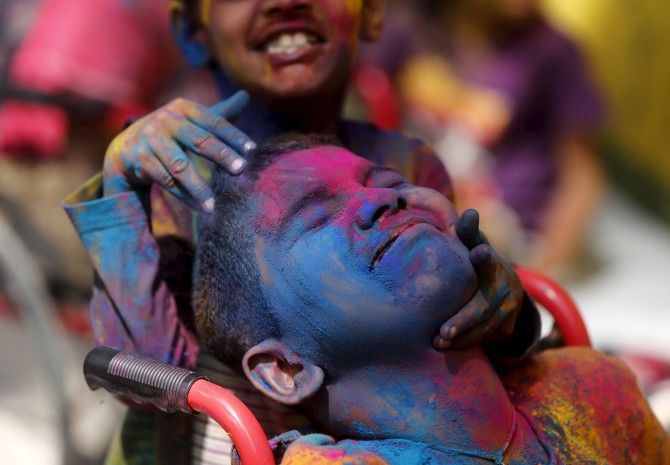
IMAGE: Initiatives are coming up across the country to make art, culture and travel accessible to the differently-abled. In this image, differently-abled children celebrate Holi. Photograph: Shailesh Andrade/Reuters
A conversation with a dear friend made Yeshwant Holkar view accessibility for the differently-abled in a new light.
"She had polio as a child and is a wheelchair user. In spite of doing extensive research about places to travel to, she would reach a destination only to find that the bathroom doorway was too narrow for a wheelchair to enter," he says.
People believe that simply installing a ramp is enough to make a place accessible to the differently-abled, but don't give a thought to other spaces and services or to persons with other types of disabilities.
"To compensate for poor accessibility, most often the hotel guys will offer to get three guys to pick a wheelchair user up and carry them inside, which is not only humiliating but also dangerous. A person could slip during the process or their wheelchair could get damaged," says Mumbai-based Holkar.
He realised that there was a need for detailed and dependable information that could help the differently-abled travel with confidence.
And thus, he and his business partner, Ben Musgrave, founded UMOJA in 2014 -- the first and largest online platform of its kind that makes finding accessible hotels easy, reliable and fun for travellers with disabilities.
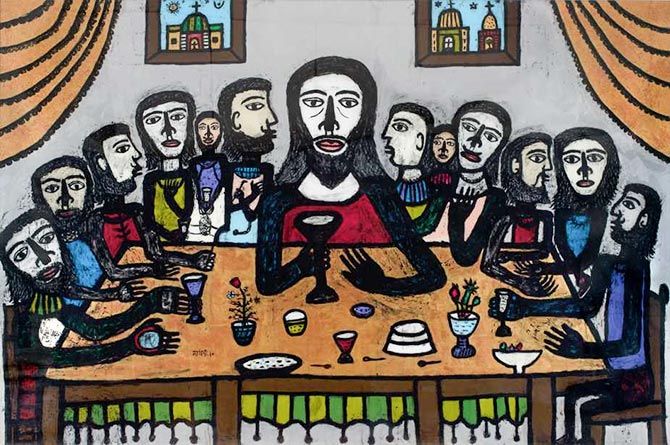
IMAGE: Last Supper by Madhvi Parekh, whose paintings were part of the show, The Curious Seeker, at the DAG Modern gallery in New Delhi. Photograph: Kind courtesy Madhvi Parekh and DAG Modern
Slowly but surely, initiatives such as these are coming up across the country to make art, culture and travel accessible to the differently-abled.
Another example is evident at the DAG Modern in New Delhi, where a group of visually impaired students can be seen engaging with Madhvi Parekh's art as part of the show, The Curious Seeker.
The vibrant world of folk traditions, childhood memories and rural deities that inhabit Parekh's work have been recreated for them through tactile toys and reproductions by heritage architect and access consultant Siddhant Shah.
This is not the first time he has worked on a project such as this -- Shah has been making tactile reproductions of masterpieces by Jamini Roy, S H Raza and the Group 1980 artists for the gallery for the past two years now, as part of the project, Aabhas -- a tactile experience, India's first art education and experience programme for the visually impaired.
Specialists like Shah are still few, so one sees them running like a thread through the various initiatives cropping up in the cities.
For instance, Shah's handiwork is also visible at Anubhav, a special tactile gallery at the National Museum, New Delhi, which has 22 tactile replicas of museum objects, carefully chosen from its vast collection representing 5,000 years of Indian art.
The gallery, which opened in 2015, was developed with the help of UNESCO, Saksham, the Open Knowledge Community, the Indian Institute of Technology-Delhi, and the National Platform for the Rights of the Disabled.
It allows full tactile access, accompanied by an audio guide and Braille labels.
"The reproductions range from the Indus Valley Girl and the Gandhara Buddha to the Yaksha-Yakshini figures and coins," says Shah.
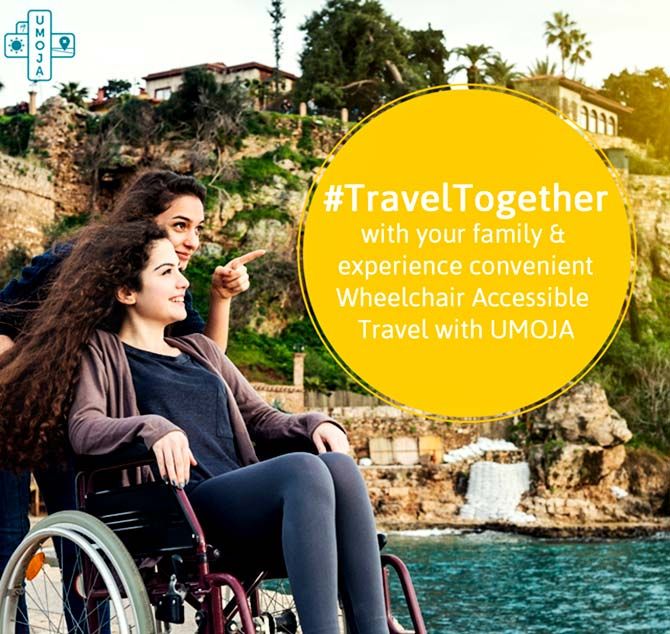
IMAGE: Yeshwant Holkar realised that there was a need for detailed and dependable information that could help the differently-abled travel with confidence. Photograph: Kind courtesy Umoja
Experiences such as the one faced by Holkar's friend have also prompted cultural festivals to rethink their space design.
The main thing standing between a differently-abled person attending, say, a major music concert or play is the hitherto widespread lack of sensitivity to their needs.
It is to address this lacuna that Sunil Kant Munjal founded the Serendipity Arts Festival as the first fully accessible cultural festival in the country.
Almost all venues at Serendipity Arts Festival (the second edition was held between December 15 and 22, 2017, in Goa) were "disability-friendly."
"There were wheelchair ramps and many projects were made accessible to visually challenged audiences, with the artworks converted to Braille," says Munjal.
"We believe in inclusion and want art to touch as many lives as possible," adds Munjal. At
At one of the venues -- the Adil Shah Palace -- there were reproductions of at least 12 artworks that included Braille reproductions of photographic prints from A Slow Violence: Stories from the Largest River Basin in the World, The Music Stopped, But We Were Still Dancing and more.
Apart from these, the festival also featured site maps and brochures in Braille to help special-needs audiences make an informed choice about which event to attend.
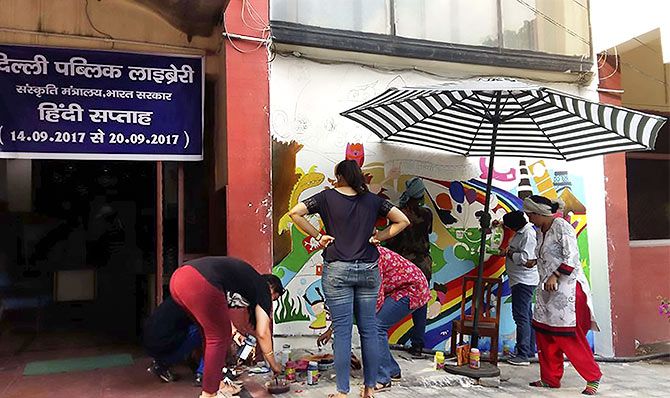
IMAGE: A tactile wall was created at the Blind School, Lodhi Road, New Delhi, which was themed Bookscapes in the City. Photograph: Kind courtesy Kyakarein.com
For teams that work on these projects, the experience of seeing faces light up is reward in itself.
To connect more people with the world of tales and fables, the Bookaroo Trust has been working with the differently-abled as part of its outreach programme for several years now.
In September last year, the team got Champa Saha, a Bengaluru-based special-needs educator and counsellor, to conduct theatre workshops at Very Special Arts -- an organisation that works with differently-abled children.
Another project brought Bookaroo and Shah together. As part of it, she created a tactile wall at the Blind School, Lodhi Road, Delhi, which was themed Bookscapes in the City.
"We also made a Braille booklet to explain the wall art to the children. Radio Mirchi created an audio book to go with it," says Bookaroo director and co-founder Swati Roy.
The 10th edition of the Bookaroo Children's Literature festival, which was held in New Delhi between November 25 and 26, 2017, carried these efforts further through panel discussions and book showcases.
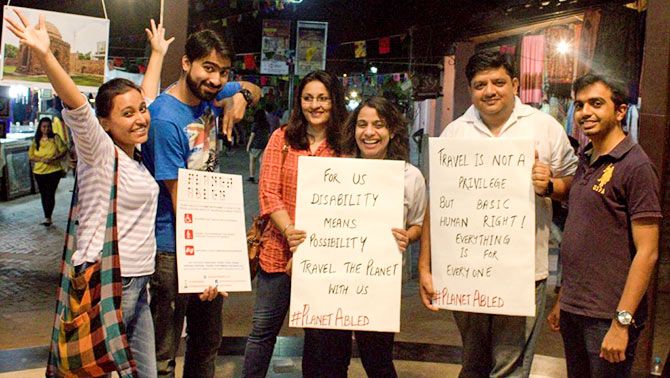
IMAGE: The inspiration for Planet Abled lies in founder Neha Arora's (seen fourth from left) experience of planning trips with her parents, both of whom have disabilities. Photograph: Kind courtesy planetabled.com
Many of these initiatives have deep personal stories behind them.
For instance, the inspiration for Planet Abled lies in founder Neha Arora's experience of planning trips with her parents, both persons with disabilities.
"My father is blind and my mother is a wheelchair user," says Arora, who started the company on January 1, 2016, after three years of groundwork.
For perhaps the first time in the world, Planet Abled applied the concept of Universal Design to travel.
Arora has started trips for mixed groups -- groups that include people with different kinds of disabilities and their families, as well as travellers without disabilities.
"Often, people with a certain disability stay in similar disability groups. But these trips give them an opportunity to understand the challenges people with other disabilities also face, thus creating a unique human interaction."
"You will find people with visual impairment, some who are wheelchair users, deaf and mute, others with Down Syndrome, and more travelling together on Planet Abled trips," she says.
It also plays a crucial role in sensitising travellers without disabilities to how different and difficult the world can be for those who do have to live with disabilities.
"Also, when these travellers go back, they start thinking of ways of making workspaces more accessible and begin to hire more people with disabilities," says Arora, who currently operates in 34-plus destinations in 11 states.
She is very proud of the first-ever rafting trip for people with disabilities in India that she conducted last year in Rishikesh.
"We had people with spinal injuries also do the rafting trip along with the mixed disability group. A blind traveller was trained to do a solo ziplining across the Ganga," she says.
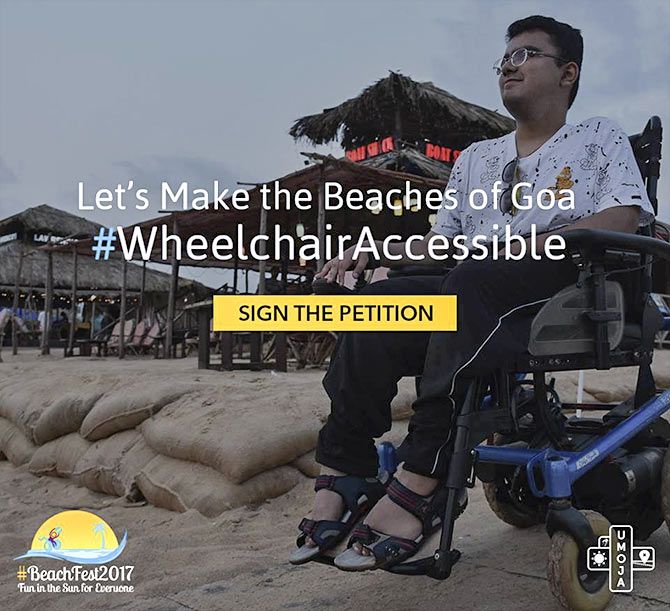
IMAGE: In March 2017, UMOJA launched #BeachWeek2017, an initiative to raise awareness about accessibility by giving wheelchair users and their families the opportunity to enjoy the beaches of Goa. Photograph: Kind courtesy Umoja
Yeshwant Holkar, too, is engaged in creating travel experiences that were earlier considered out of bounds for the differently-abled.
For instance, in March last year, UMOJA launched #BeachWeek2017, an initiative to raise awareness about accessibility by giving wheelchair users and their families the opportunity to enjoy the beaches of Goa.
"We worked with the local authorities to create a 10-day fest in which a ramp was created all the way down to the beach," he says.
A floating wheelchair allowed the differently-abled experience the joy of floating in the sea, under the supervision of lifeguards.
"The local MLA has promised to make seven beaches in Goa accessible. We hope to see that come to fruition," says Holkar.
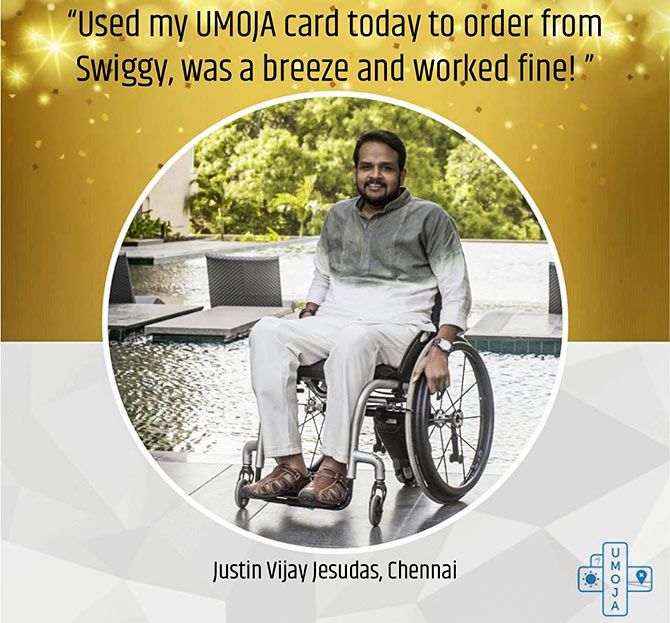
IMAGE: The Umoja team has also come up with the UMOJA card -- the first discount card for the differently-abled. Photograph: Kind courtesy Umoja
Besides writing the first wheelchair user's guide to Goa, the team has also come up with the UMOJA card -- the first discount card for the differently-abled -- which is a new way to experience benefits at accessible restaurants, hotels, pharmacies, shops and more.
For this, the team worked with people with mobility impairments to understand what their average purchases were in a month and the difficulties they faced in the process of buying.
With those insights, it has put together a network of service providers that includes Grofers, Swiggy and Pharmeasy who have created benefits for the differently-abled.
"Through this, we want businesses to see people with disabilities as a market and start making better products and services for them. When they see thousands of people using this card, businesses will be able to quantify this market and pay attention to it," he says.











